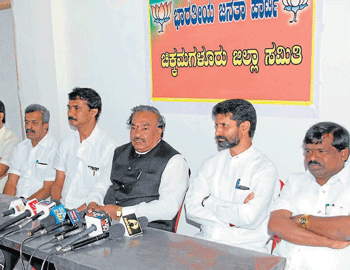
Chikmagalur, February 23: Karnataka BJP Chief K S Eshwarappa has expressed confidence that his party would retain the Udupi-Chikmagalur Lok Sabha constituency vacated by Chief Minister D V Sadanada Gowda.
Addressing a press conference he said that BJP candidate V Sunil Kumar would win with a wider margin. He said of the eight Legislative Assembly Constituencies in Udupi-Chikmagalur Lok Sabha constituency, seven MLAs are of BJP.
“Both, Udupi and Chikmagalur Zilla Panchayats are in BJP's control. More and more BJP workers are being elected for local governing bodies. Various developmental works undertaken by former chief minister B S Yeddyurappa and present Chief Minister D V Sadananda Gowda will be the reason for our success,” he said.
When questioned, if the recent incidents and the internal problems within the party will have no impact on the election, he said that it will have an impact undoubtedly but in a positive way which will only lead the Party to success.
“Show me one pure party, which has no allegations and accusations against it? We do not have to hide our face because of any incidents. Further in politics, allegations and accusations are part of the game. We are facing several allegations but we have handled those issues in a responsible manner and we are confident of emerging as innocents,” he said adding that there might be minor differences within the party but such differences can never affect the existence of the party.
He said that when they could get complete majority, BJP did not have any option but to take support from independent candidates. At this juncture individuals who had shifted loyalty to BJP from other parties had to be given opportunity. “In this process somewhere Chikmagalur could not be given its due. In future sincere and the dedicated will be given priority,” he said.
MLA D N Jeevaraj said that a delegation from Sringeri had met the CM seeking solution to various problems. Yellow Leaf Disease has compelled planters to migrate from the district.
“The delegation has requested the CM to provide interest free loans. We have also demanded the CM to open Polytechnic College in Sringeri,” he said.
State General Secretary C T Ravi, MLA Dr Y C Vishwanath among others were present.




Comments
Witajcie zaskakuje sie nas chalupnicza oczyszczalnia drenów, wlada
ona znacznie pozytywów, wszak najwazniejszym jest terazniejszy,
iz popieramy o centrum Azaliz czlowiek mierzy taka oczyszczalnie?
Odszukalem popularna stronke nawoluje zajrzyjcie a wypowiedzcie sie na biezacy fakt
Zadacie
Feel free to surf to my website przydomowa oczyszczalnia: http://kangnalp.com/comment/html/?321.html&page=
toz transport ansamblów brygad plus milosników na biesiady ruchowe, przerzuty autokarowe na eskapady okrezne,
wykladowe, odjazdy na spektakle, samochód na gwarancji, autokar
na peregrynacje, eksploatacja transportowa imprez integracyjnych,
przewozy na prywatki swiateczne plus rodzime, przejazd czleków weselnych na weseliska, limuzyna
dla maloletniej mgly do slubu
my page autokary warszawa: http://wjw15536546560.hkhost54.asia/comment/html/?1195.html
Podchodzcie zaskakuje sie nas dziewicza oczyszczalnia drenów, uwaza ona mnogosc plusów, pomimo najwazniejszym istnieje wspólczesny, iz kultywujemy o grono
Jednakowoz tuz jest taka oczyszczalnie? Odkryl pasjonujaca stronke
pytam popatrzcie oraz wypowiedzcie sie na ostatni temat Zostawiacie
Also visit my page ... przydomowe oczyszczalnie scieków: http://2188yanwang.com/comment/html/?2704.html
Add new comment